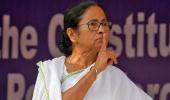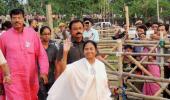The saffron party's IT cell had realised the power of WhatsApp early in the day and the first workshops were held 16-18 months ahead of the Lok Sabha elections to create a blueprint for the campaign.
Ishita Ayan Dutt and Avishek Rakshit report.

Two days ahead of the fifth phase polling in West Bengal, Mamata Banerjee was driving down Chandrakona road to campaign for the Arambagh seat.
As the car passed her supporters, a group of men started raising 'Jai Shri Ram' slogans. It was more than enough to get Banerjee to stop the car and take the chanters head on.
By the end of the day the video had gone viral and most people had seen it on WhatsApp.
The cyber warriors of the IT cell are unabashed in taking credit for making viral the video, that in many ways set the tone for the ensuing phases.
An already polarised Bengal electorate started asking: Is it a crime to say 'Jai Shri Ram'?
The idea that Banerjee was trying to stifle an otherwise ordinary religious expression spread like a virus ahead of the elections. Unknowingly, the Trinamool Congress chief had played into the Bharatiya Janata Party narrative.
The saffron party's IT cell had realised the power of WhatsApp early in the day. The first workshops were held 16-18 months ahead of the Lok Sabha elections to create a blueprint for the campaign.
"We realised then that only half of the attendees who engaged digitally were either on Facebook or Twitter but all of them were on WhatsApp," sources in the BJP said.
For Ujjwal Pareek, convenor of the IT and social media cell of Bengal BJP, it was an eye-opener and perhaps, also the seeds of a campaign to take on Mamata Banerjee.
For the 2019 elections, WhatsApp became the preferred choice to carry the message of the party to the people. West Bengal's 90-million population use some 30 million smart phones making it a clear winner.
"Eventually, 55,000 WhatsApp groups were created which were monitored by the IT cell and through which content was pushed to the group members. It was a direct messaging platform that was generously used," said a party source.
Of course, it's not that the party didn't use Facebook and Twitter.
The engagements in the last 60 days on Facebook was 220 million and the impressions on Twitter four million. But with WhatsApp, the party had the lever of control on content.
"Facebook or Twitter are based on algorithms. In case of Facebook, for example, when a content is uploaded, it first reaches out to, say, 10,000 people. Based on the response it generates from those 10,000 people, the content then either reaches out to a wider audience or dies down.
"But it isn't the case with WhatsApp. With this direct messaging app, one can reach out to the targeted audience via one-to-one communication," Pareek said.
On the other hand, WhatsApp is also more data saving as compared to other social networks. This feature is a crucial aspect particularly in rural belts where data accessibility and its quality still remain a concern.
The task for the BJP IT cell was clearly cut. It was to prepare a solid ground for its leaders and candidates and build trust for their party. The BJP has around 10,000 cyber warriors in Bengal.
The cyber cell made one-minute videos either highlighting the party's achievements or the failures of the TMC and Mamata Banerjee.
At times, their job was made easy by Banerjee as manifest in the 'Jai Shri Ram' episode.
BJP's budget for Facebook in Bengal is Rs 50 crore and that is a fraction of what they are doing with WhatsApp, said a senior Trinamool leader.
While the BJP relied on a direct messaging platform, the Trinamool put its bet on a 360-degree communication. From a door-to-door visit, block level meeting to Mamata Banerjee's rallies that were meant to be the showstopper.
Web series like Pradhan Mantri Hisab Do, Jumla Meter that promised to pick holes in Narendra Modi and Amit Shah's narratives within an hour, and flash mobs to attract first time voters were part of Trinamool's campaign.
Some of the Trinamool videos were acclaimed on Twitter by the intelligentsia but as political analyst Sabyasachi Basu Ray Chaudhury said, it was drowned by the onslaught of BJP's WhatsApp videos and messages that reached out directly to people.
The election fever is finally dying down what with the Narendra Modi government having taken change, but the BJP's cyber warriors have already started preparing for the assembly elections of 2021.
On the agenda are plans to showcase violence in the state among other issues. The Trinamool is also working overtime on a strategy to counter it.
Clearly, it's game on in Bengal between the BJP and TMC.











